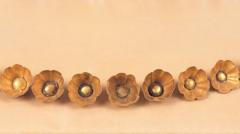In the heart of Khartoum, Sudan, the National Museum stood as a testament to the rich heritage of the Nubian civilizations that once thrived in the region. This cultural landmark, decorated with magnificent statues and wall paintings, was a cherished site for both locals and tourists alike. However, the outbreak of war two years ago dramatically altered the museum's fate. With the military regaining control over the capital following the ousting of the rival Rapid Support Forces (RSF), an unsettling truth has emerged - the war has left an indelible mark of destruction on Sudan's cultural institutions.
Amidst the ruins of government buildings and charred structures, the National Museum has been particularly affected, with officials estimating that tens of thousands of artefacts have either been obliterated or clandestinely sold off during the RSF’s reign in central Khartoum. Ikhlas Abdel Latif Ahmed, director of museums at the National Corporation for Antiquities and Museums, expressed her sorrow, stating, "They destroyed our identity, and our history." Once a hub of cultural education and admiration, the museum is now riddled with evidence of looting and devastation.
Wide-reaching assaults on Sudan's cultural sites have been reported, prompting Unesco to issue alerts about the encroaching threat to precious heritage. Looting at the National Museum occurred while important collections were temporarily secured for rehabilitation, facilitating the removal of invaluable objects. Officials suspect these artefacts may be in the United Arab Emirates, amid allegations of RSF funding and illicit trade in gold.
Among the treasured pieces now missing is a remarkable gold collar from the pyramid of King Talakhamani, which dates back to the 5th century BC. The loss of such artefacts has incalculable implications, transcending dollar values and representing the erosion of a cultural legacy. Protecting this heritage is urgent; the Sudanese government plans to engage with organizations like Interpol and Unesco for potential recovery, but the action's feasibility remains uncertain.
Critics have condemned these acts not as mere criminality, but as a conscious campaign against Sudan's historical narrative. Analysts like Amgad Farid stress that these attacks represent systematic efforts to undermine national identity and erase millennia of significance to global history. As violence continues to displace millions and the human cost escalates, the war's broader repercussions reach far beyond the physical to threaten the very essence of Sudanese culture itself.
In spite of despair, Ahmed and determined advocates envision a future where the museum stands restored. "Inshallah [God willing] we will get all our collections back," she asserts, embodying hope and a desire for a rebirth of cultural pride amid adversity.






















